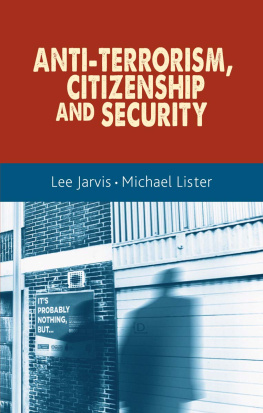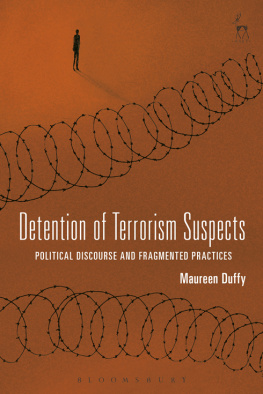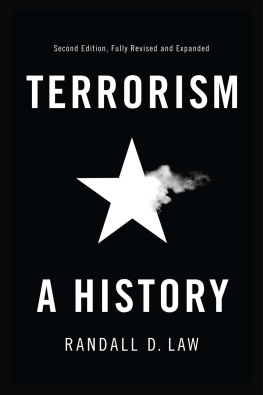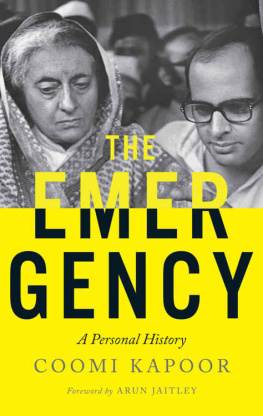Deport Deprive Extradite
21st Century State Extremism
Nisha Kapoor

First published by Verso 2018
Nisha Kapoor 2018
All rights reserved
The moral rights of the author have been asserted
1 3 5 7 9 10 8 6 4 2
Verso
UK: 6 Meard Street, London W1F 0EG
US: 20 Jay Street, Suite 1010, Brooklyn, NY 11201
versobooks.com
Verso is the imprint of New Left Books
ISBN-13: 978-1-78663-347-7
ISBN-13: 978-1-78663-349-1 (UK EBK)
ISBN-13: 978-1-78663-350-7 (US EBK)
British Library Cataloguing in Publication Data
A catalogue record for this book is available from the British Library
Library of Congress Cataloging-in-Publication Data
Names: Kapoor, Nisha, 1980-, author.
Title: Deport, deprive, extradite : 21st century state extremism / Nisha Kapoor.
Description: New York : Verso, 2018.
Identifiers: LCCN 2017052579 | ISBN 9781786633477 (hardback)
Subjects: LCSH: TerroristsLegal status, laws, etc. | ExtraditionCases. | Detention of personsCases. | DeportationCases. | Emigration and immigrationGovernment policy. | Political crimes and offenses. | BISAC: POLITICAL SCIENCE / Political Freedom & Security / Human Rights. | POLITICAL SCIENCE / Political Freedom & Security / General. | POLITICAL SCIENCE / Civics & Citizenship.
Classification: LCC K5445 .K37 2018 | DDC 342.08/2dc23 LC record available at https://lccn.loc.gov/2017052579
Typeset in Sabon by MJ & N Gavan, Truro, Cornwall
Printed in the UK by CPI Mackays, UK
For Mama
Contents
Life Sentence
to kill
is to erase an image
off a mirror:
swift glance &
side-step,
no body
just a gaping hole
upon an indifferent world
Syed Talha Ahsan, 2011
It was after 3 am when Lotfi Raissi woke to a bang on his front door. On opening it he was faced with armed policemen with a warrant. A piece of paper was flashed before him and a gun held to his head. He was being arrested, they told him, in relation to the 11 September 2001 attacks. He was forcibly stripped and held in a police van before being taken to a local police station. His wife and brother, also arrested, were taken elsewhere. Some days later his family members were released, and though on the seventh day the charges against Lotfi were dropped for lack of evidence, he was immediately re-arrested
An Algerian national living in London, Lotfi appeared in national press headlines as The Terror Instructor, a caption that referred to the basis of his arrest which concerned accusations by US authorities that he had taught four of the men involved in the 9/11 attacks at a flight school in Arizona.
Lotfi was first alerted to his impending arrest when Sunday Times journalists arrived at his home the day before the police raid and told him he was on the FBI watch list. Twenty-four hours later he was headline news with some sections of the press reporting that anti-terror police had foiled a plot to hijack a passenger jet and crash it into the centre of London. The story played a critical role in supporting the notion already floating that another terrorist attack was imminent in Britain and media stories which claimed that in Britain dozens of terrorists were on the run. Around the same time, the White House confirmed that special forces from Britain and the US were already active in Afghanistan. Media campaigns made it clear that fighting the terrorist threat meant tightening domestic security as much as it did escalating military intervention overseas, and Lotfis case became emblematic in this emergent national imagination fixated on the imminent threat of terrorism.
Three years earlier there had been another dawn raid, this one at the home of Adel Abdul Bary, an Egyptian human rights lawyer Both men would remain incarcerated for another ten years as they battled extradition before they were eventually transferred in 2011.
While their stories of criminalisation bear much resemblance, the final outcomes for Lotfi Raissi and Adel Abdul Bary were quite different. Though in both cases the evidentiary basis for the extradition requests was weak, their experiences of the justice system varied.
In Lotfis case, the basis of the extradition request from the US concerned minor charges namely that he had failed to disclose on a Federal Aviation Administration form a previous knee surgery, a visit to a healthcare professional and a previous minor conviction for theft in London. The prosecution argued that these, however, were interim holding charges, asserting that they had grounds to believe Lotfi was a terrorist involved in the 9/11 atrocities, and accordingly requested a sixty-day adjournment of the extradition case so that they could bring a further charge against him relating to a terrorist offence.
While he was detained, the Washington Post published a report showing that the extradition request was largely for the purposes of intelligence gathering. An FBI official speaking to journalists about Lotfis case pointed to their uncertainty about his connection with the 9/11 hijackers, stating, We put him in the category of maybe or maybe not, leaning towards probably not. Our goal is to get him back here and talk to him to find out more.
In Adels case, the evidence gathered against him by British police, which was not deemed sufficient to charge him in the UK, was transferred to the US and formed the basis of the indictment against him. It included a fax obtained from his office reporting the embassy bombings, information which had been widely distributed at the time, and the testimony of an anonymous witness, Confidential Source Number 1.
Whereas in Lotfis case the US extradition request was ultimately dismissed in 2002 when the prosecution failed to provide credible evidence and the judge ruled that such evidence did not exist, Adels appeals were not successful and his extradition, along with that of Khalid al-Fawwaaz, was ultimately granted in 2001.
What was common and therefore also analytically central to both cases was the racial representation that cut through He was vindicated in the newspaper by his familys respected name, as his uncle was a senior officer in Algerias anti-terrorist branch, an association which qualified him to be a good Muslim in the media. To the contrary, Adels affiliation with Egyptian Islamic Jihad (EIJ), which had sought the overthrow of the Mubarak regime, in the 1980s and 90s, pre-dating the organisations links with al-Qaeda, was drawn on to mark him as a bad Muslim.
Simultaneously, the racism which dehumanised both subjects proceeded alongside a pervasive media and political discourse that insisted the disciplinary techniques available to the state were insufficient for dealing with the threat that terrorism posed. The bureaucratic wrangling which prevented the extradition of Lotfi Raissi spurred on the agenda of the then home secretary, David Blunkett, for improving the efficiency of extradition arrangements between Britain and the US by reducing levels of judicial scrutiny. Blunkett would tell the House of Commons in October 2001 that since Britains love of freedom did not extend to offering hospitality to terrorists the emergency terrorism Bill [which became the Anti-Terrorism Crime and Security Act 2001] and a separate extradition measure would ensure Britain had robust and streamlined procedures in place. In practice this would mean that in the future the US would not be required to provide prima facie evidence to support its extradition requests. Executive power, police power, judicial protocols, and laws for dealing with counterterrorism both in the domestic context and at the level of international policing between states were argued to be inadequate, unnecessarily stifling and long-winded. Populist calls for greater efficiency, for more effective state power spurred on political agendas concerned with negotiating the problem of further enhancing law and order against constraints of the liberal rights framework.













